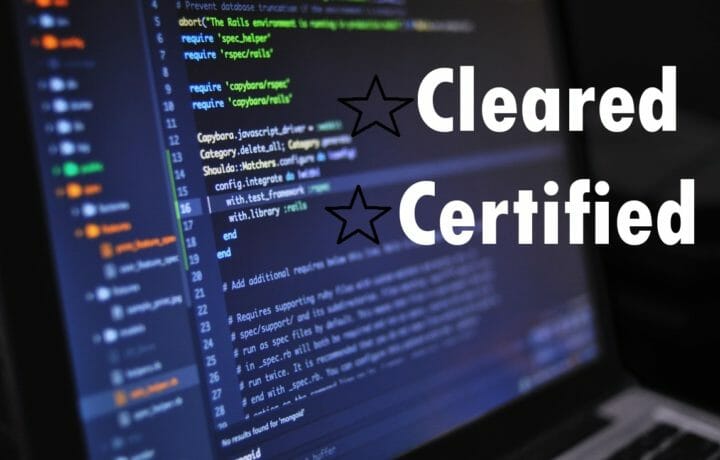There are so many tech certifications today. Sometimes it is hard to understand which certifications are necessary and which would enhance your profile and skill set. Coupled with the high price of training and exam costs, it can be difficult to know how to get the most return on your investment. VMware, Microsoft, Cisco and CompTIA certifications certainly lead the market in the most sought after, however, there are other certifications that may be worth your while. Vendors such as Nutanix, EC-Council, Amazon Web Services and RedHat all offer great training programs and certification paths, as well. So, the question is, how you decide on which certification is worth your time and money?
Throughout this blog series, Cleared & Certified, some of the less obvious certifications will be discussed, as well as whether or not they fit into your overall goals. The hope is that readers will weigh in and start a discussion based on their experience and opinions on various certifications. As the series evolves, input from readers as to which certification(s) they would like discussed will help to drive the topics of each post. The first post in the series will focus on the Red Hat certification structure, and whether or not pursuing this certifications path is worth it.
Red Hat Certification Background
Red Hat certifications have grown significantly over the years. More companies and government entities are adopting Red Hat as a viable operating system in their architectures. With the advance of cloud computing, cloud storage and virtualization, Red Hat certs have expanded to keep up with the demand of the market. The two main certifications Red Hat offers are the Red Hat Certified System Administrator (RHCA) and the Red Hat Certified Engineer (RHCE). According to Red Hat’s website, the RHCA is able to perform the following tasks:
- Understand and use essential tools for handling files, directories, command-line environments and documentation
- Operate running systems, including booting into different run levels, identifying processes, starting and stopping virtual machines, and controlling services
- Configure local storage using partitions and logical volumes
- Create and configure files systems and file system attributes, such as permissions, encryption, access control lists, and network file systems
- Deploy, configure and maintain systems, including software installation, update, and core services
- Manage users and groups, including use of a centralized directory for authentication
- Manage security, including basic firewall and SELinux configuration
Although it seems like a lot to take in for an entry-level certification with Red Hat, with proper training and experience, you can pick it up.
Red Hat Training Available
Even though there is training available for the Red Hat certification, it is not required in order to sit for the exam. RHCA training can help you prepare for the exam, as it touches on all of the exam blueprint items. Just as well, if you are a seasoned Red Hat administrator already, it might not be worth your money and time to take time away from work to attend training. Red Hat offers two different types of training depending on your background and experience. For Windows system administrator you will want to take both Red Hat System Administration I (RH124) and Red Hat System Administration II (RH134) courses. For Linux administrators you will want to take the RHCSA Rapid Track Course (RH199). These courses range in cost from $3,145 to $3,700 depending on how you take the training – classroom, remote classroom or live online.
Exam Details
The RHCA exam will cost you $400 and you have 2.5 hours to complete the exam.
What Next?
If you are successful with the RHCA exam and feel like expanding your Linux skills as they relate to Red Hat, then you can tackle the RHCE training and requisite exam. Furthermore, if you pass the RHCE and wish to keep going with the Red Hat certs there are many to choose from. If your focus is on virtualization technologies, you can pursue a Red Hat Certified Specialist in Virtualization. There are other specialist certs for different technologies such as Enterprise Application Server Administration, High Availability Clustering, Linux Performance Tuning, Configuration Management, OpenStack and Application Development.
Is it For Me?
If you are a Red Hat administrator already but have not validated your skills with a certification, then go for it. You may already be proficient with Red Hat and gaining one or several of their certifications will be a good return on your investment. You may even be able to get your company to pay for the exam. If you have been focused on Windows administration, or if you are a VMware administrator, there is some grey area here. You will have to decide if this will amplify your current skill set and/or make you more marketable. You may want to ask yourself, do I want to learn Red Hat? Is my customer/company wanting you to learn Red Hat? These are important questions to think about when making the decision.
Good luck!



